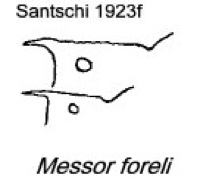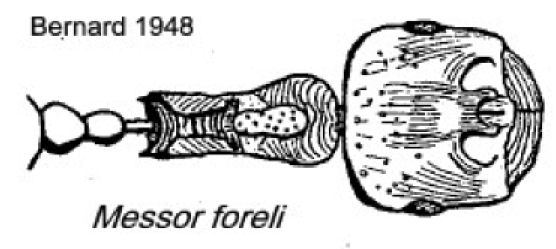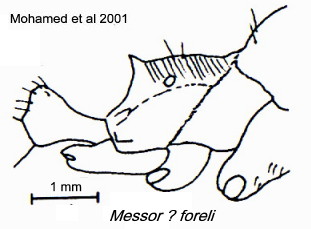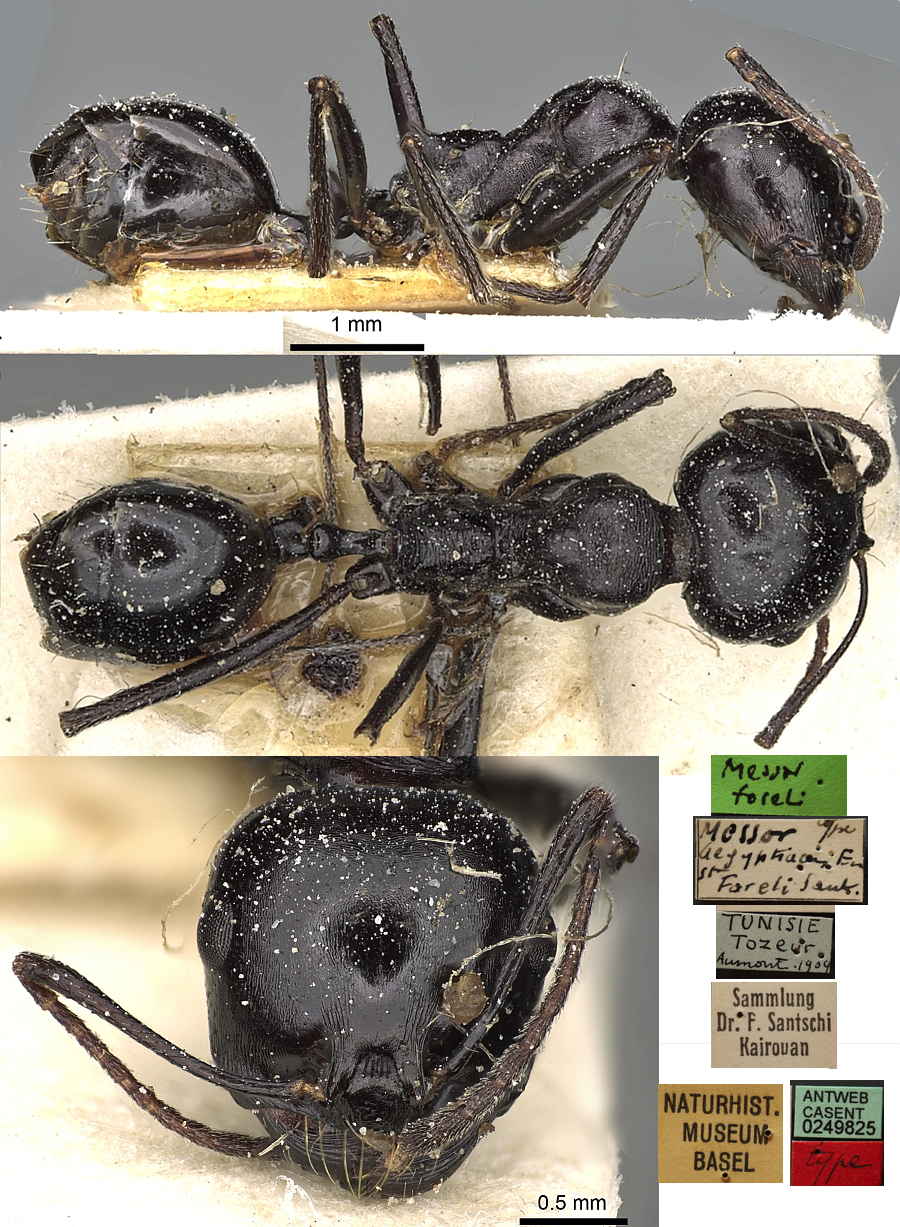Messor foreli (Santschi)
 Type location Tunisia
(Messor aegyptiacus Em. var foreli n. var., Santschi,
1923f: 322,
illustrated, worker; raised to species Bernard, 1951: 92) - see below. Type location Tunisia
(Messor aegyptiacus Em. var foreli n. var., Santschi,
1923f: 322,
illustrated, worker; raised to species Bernard, 1951: 92) - see below.
fossulatus (Messor
aegyptiacus Em. var. fossulatus
n. v., Santschi, 1923f: 323, illustrated, all
forms) from Tunisia - junior synonym of Messor foreli, Cagniant &
Espadaler (1998: 427) see http://www.antweb.org/specimenImages.do?code=casent0913145
striatulus (Aphaenogaster
(Messor) Barbarus L. var. striatulus
Emery, 1891b: 11, worker - raised to species Cagniant & Espadaler
(1998: 427) - see http://www.antweb.org/specimenImages.do?code=casent0904121;
unavailable
name curvispina, Karavaiev,
1912a: 10, soldier & worker; Santschi, 1923f: 321) - no images on
Antweb (March 2019)
surcoufi (Messor
aegyptiacus Em. var. surcoufi
n. var., Santschi, 1923f: 324, worker) from Algeria - subspecies of Messor foreli, Cagniant &
Espadaler (1998: 428) - see http://www.antweb.org/specimenImages.do?code=casent0913149
|
  Santschi's (1923f) description
is at Santschi's (1923f) description
is at  . reporting findings from the Fezzan area
of inland Libya, Bernard (1948: 139) gave an illustration of foreli,
he noted that its niche was in alluvial soil of deserts, at the
periphery of oases and in gardens. . reporting findings from the Fezzan area
of inland Libya, Bernard (1948: 139) gave an illustration of foreli,
he noted that its niche was in alluvial soil of deserts, at the
periphery of oases and in gardens.
|
 Egypt records
- Menozzi (1929e, as variety of M. aegyptiacus) several workers
from Kaa desert, Sinai, collected by F S Bodenheimer. Mohamed et al
(2001, illustrated); the illustration and their key separation
"Propodeum armed with triangular teeth, body entirely black, dorsum of
propodeum completely striated; petiole with three pairs of hairs",
conflicts with Santschi's description, which has the sculpturation
reduced when compared with aegyptiacus (not found in Sinai by
Mohamed et al) and has the flat downturned propodeal teeth;
erect hairs rare on the alitrunk and the rest glabrous (apart from on
the anterior head and gastral apex). I conclude the Mohamed et al
finding was more likely to have been aegyptiacus. Egypt records
- Menozzi (1929e, as variety of M. aegyptiacus) several workers
from Kaa desert, Sinai, collected by F S Bodenheimer. Mohamed et al
(2001, illustrated); the illustration and their key separation
"Propodeum armed with triangular teeth, body entirely black, dorsum of
propodeum completely striated; petiole with three pairs of hairs",
conflicts with Santschi's description, which has the sculpturation
reduced when compared with aegyptiacus (not found in Sinai by
Mohamed et al) and has the flat downturned propodeal teeth;
erect hairs rare on the alitrunk and the rest glabrous (apart from on
the anterior head and gastral apex). I conclude the Mohamed et al
finding was more likely to have been aegyptiacus.
Sharaf list - material examined: El-Mafareq (South
Sinai),
1.iv.1998 (1); El-Mafareq (South Sinai), 18.ii.1999 (1); El-Mafareq
(South Sinai), 2.v.1998 (1); El-Mafareq (South Sinai), 14.xi.1998 (1);
Gebel Asfar (Qalyubiya), 29.iv.2003 (3) (SHC).
|
 The photomontage of the holotype worker from Tunisia
is collated from http://www.antweb.org/specimen.do?name=casent0249825 The photomontage of the holotype worker from Tunisia
is collated from http://www.antweb.org/specimen.do?name=casent0249825
|
|